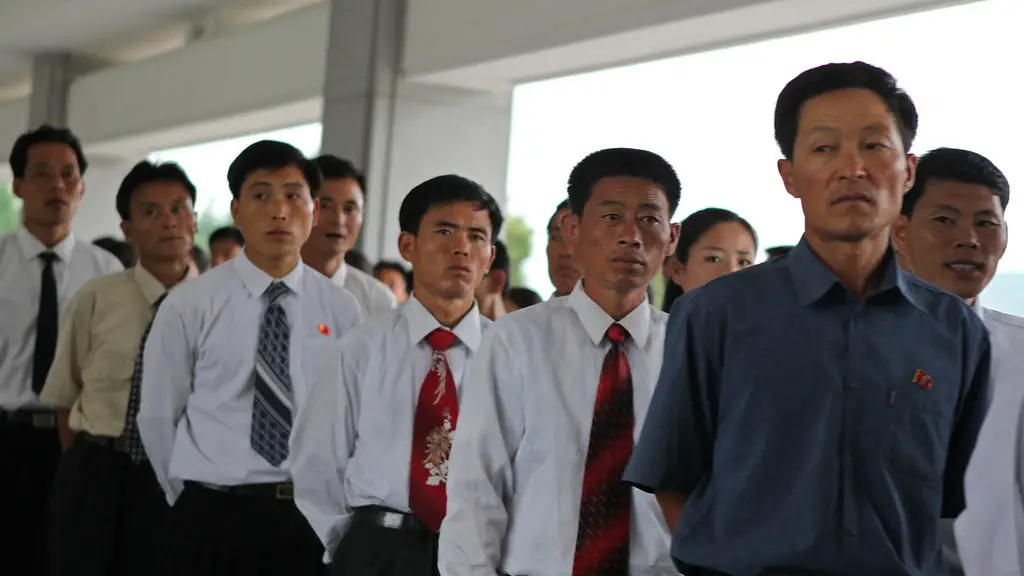Impact of Sanctions on North Korea
North Korea is a country that has been at odds with much of the international community for decades. They are known for their oppressive government, their nuclear weapons program and their aggressive foreign policy. In response to these actions, numerous sanctions have been placed on North Korea by the international community. This article will take a look at what these sanctions are, and their impact on the North Korean economy and people.
The first and most prominent sanctions imposed on North Korea are the United Nations (UN) Security Council sanctions. These sanctions are imposed in order to limit the flow of money and material that can be used to support the North Korean government’s military and nuclear weapons programs. This includes limiting weapon exports, restrictions on financial transactions as well as on the importing of oil. Additionally, the UN sanctions restrict North Korean shipping and aviation activity, and limit travel by individuals with ties to the North Korean government.
In addition to the UN sanctions, many countries, including the United States and its close allies, have imposed their own economic sanctions. These sanctions include restrictions on banking transactions, bans on imports of North Korean products, and travel bans for North Korean citizens. They also include measures to prevent North Korea from accessing the financial markets, and hinder its ability to access foreign currency.
The impact of these sanctions on the North Korean economy has been immense. The country has faced shortages of food and medical supplies due to the lack of imports and restrictions on trade. Furthermore, North Korea’s economy has been severely weakened due to the restrictions placed on their access to the international financial system. Additionally, there have been reports of widespread human rights abuses that have emerged from the struggles faced by the people of North Korea as a result of the sanctions.
Despite the severity of the impact that the sanctions have had on the North Korean economy, there is evidence to suggest that the sanctions have been effective in curbing some of the government’s more severe actions. For example, after the imposition of the UN sanctions, there has been a decrease in the number of weapons tests and nuclear missile launches. Additionally, there have been some indications that the North Korean government has begun to engage in more diplomatic negotiations with the international community, something that seemed impossible before the sanctions were imposed.
Political Impacts of North Korea Sanctions
The sanctions against North Korea have had a major impact on the country’s political climate as well. Because of the increased restrictions placed on the government and its access to resources, the North Korean government has had to alter its foreign policy in order to survive and appease the international community. North Korea’s foreign policy has shifted from a more aggressive stance to one that is less confrontational, and has resulted in the country engaging in dialogue with the international community more often.
Moreover, because of the sanctions, North Korea is now more open to the idea of economic and military cooperation with the international community. This is likely due to the fact that the country is being financially squeezed by the sanctions, and is hoping to alleviate some of that pressure through cooperation with the international community.
Finally, the sanctions have also resulted in the emergence of a growing civil society within North Korea. Because the sanctions have limited the government’s access to resources, there are now more opportunities for citizens to organize and speak out against the government and its policies. This has led to more civic engagement within the country and has the potential to unlock more freedoms for its citizens.
US Sanctions on North Korea
The United States has been one of the most vocal opponents of North Korea’s nuclear program and its policies in general. As a result, the US has imposed sanctions of its own against North Korea that are, in some ways, even harsher than the UN sanctions.
The US sanctions are aimed at denying the North Korean government access to resources it needs to develop its weapons program and pursue its belligerent foreign policy. They impose trade restrictions, financial sanctions, and prohibitions on all US imports from North Korea. Furthermore, US sanctions also prohibit US companies from investing in North Korean businesses.
In addition to economic sanctions, the US has also imposed travel restrictions and other restrictions on individuals and entities that the US believes have links to the North Korean government. This includes individuals who have provided financial, material or technological assistance to the North Korean government, individuals who have acted as agents of the North Korean government, and foreign companies or countries that do business with North Korea. The US also regularly adds additional targets to its sanctions list, demonstrating the country’s commitment to holding North Korea accountable for its actions.
China’s Role in Implementing North Korea Sanctions
China is North Korea’s closest and most important ally, and as such, plays a key role in the implementation of sanctions against the country. While China has been hesitant to join the international community in condemning North Korea’s nuclear weapons program and foreign policy, it has been cooperating in implementing the various sanctions against the country.
For example, China has pledged to abide by the UN sanctions against North Korea, and has implemented additional restrictions on trade and financial transactions with the country. Additionally, China has also publicly denounced North Korea’s nuclear weapons program and has increased its focus on securing the border between the two countries in order to limit the flow of illicit goods and resources.
Ultimately, China’s role in the implementation of the international sanctions against North Korea is important, because it is the country that has the greatest influence over the North Korean government. As such, it is vital that China continues to cooperate with the international community and facilitate the implementation of the sanctions.
Implications Of Sanctions For North Korea’s Future
The impact of the sanctions have been heavily felt by the North Korean people, and the country’s political, social and economic landscape have changed drastically due to the sanctions. While there have been some positive results, overall the sanctions have had a detrimental effect on the lives of North Koreans. The country is estimated to be in the midst of its worst economic crisis in decades, and shortages in food and medical supplies are common occurrences. This has resulted in much suffering for the people, including a rise in poverty, malnutrition and even death in some cases.
The sanctions have also had an impact on North Korea’s relationships with the international community. While the North Korean leadership seems to be more open to diplomatic negotiations and is engaging in dialogue more often, the country is still largely isolated and there has been little movement towards normalizing its relations with its neighbors or the United States.
Finally, it is unclear what the future of the sanctions will be. There are increasing calls for them to be lifted, but for that to happen, North Korea must demonstrate that it is taking steps to dismantle its nuclear arsenal and adhere to international standards. Until then, the country will likely continue to suffer from the devastating effects of the sanctions.
International Public Opinion on North Korea Sanctions
The international community has been largely united in its stance towards North Korea and its nuclear weapons program, with strong condemnation and stringent sanctions placed on the country for its actions. However, there is still much debate about whether or not the sanctions are effective.
On one hand, there is evidence to suggest that the sanctions have been somewhat effective in curbing some of the North Korean government’s more egregious actions. On the other hand, there is also evidence that the sanctions have been incredibly damaging to the North Korean people, resulting in poverty, malnutrition and other human rights abuses.
Thus, opinions on the effectiveness of the sanctions are divided. Some argue that the sanctions are necessary in order to keep North Korea in check, while others contend that the sanctions are too punitive and that they do not adequately address the underlying causes of conflict. Ultimately, it is up to the international community to decide the best course of action moving forward.
What Will Be The Future Of North Korea Sanctions
The future of the sanctions placed on North Korea is uncertain. If the country continues to pursue its nuclear weapons program and refuses to cooperate with the international community, it is likely that the sanctions will remain in place for the foreseeable future. However, if North Korea takes steps to dismantle its nuclear arsenal and adheres to international standards, there is a chance that the sanctions could be lifted.
At present, there are ongoing negotiations between the United States and North Korea in order to achieve this goal. If successful, the sanctions would be lifted, allowing North Korea to re-engage with the global economy and, by extension, its citizens to benefit from the improved socio-economic conditions that would result.
Another possibility is that some of the sanctions could be loosened or relaxed before they are completely removed in order to alleviate some of the burden on the North Korean people. This could include steps such as allowing food and medical supplies to enter the country, or relaxing certain financial and trade restrictions.
Either way, it seems clear that the North Korean issue is far from resolved and the future of the sanctions placed on the country remains uncertain. The international community must continue to coordinate and cooperate in order to ensure that meaningful progress is made on this issue.

